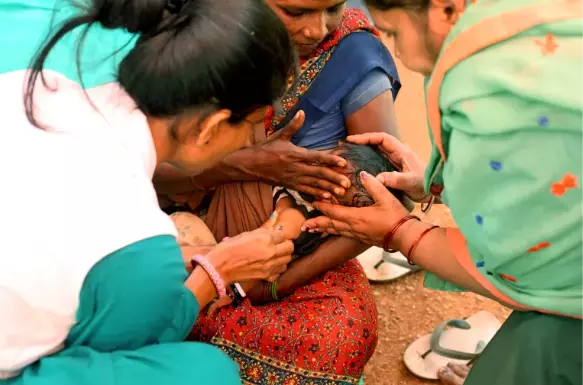India's Measles Crisis: Insights from Johns Hopkins Research

Hyderabad: India grapples with a formidable challenge as measles cases surge, catapulting the nation to the top rank globally. Between April and September 2022, the country witnessed a staggering rise in cases, prompting nationwide appeals for vaccination campaigns. The disruption caused by the pandemic to routine vaccinations worsens the crisis, leading to tragic deaths among children in Maharashtra due to suspected measles. According to these latest reports from CDC prompt action is imperative as states like Maharashtra, Gujarat and Jharkhand witnessed a record of 1,500 to 2,500 cases, jeopardizing measles elimination by 2023.
Amidst a concerning backdrop of soaring measles cases in India, a glimmer of hope arises from groundbreaking research conducted by Johns Hopkins University on Remdesivir's impact on measles pathogenesis presents promising findings that could revolutionize measles treatment and prevention strategies, reveals promising avenues in combating the measles crisis.
" The focus of our research lies in assessing the effectiveness of remdesivir, a broad-spectrum antiviral medication, in preventing and treating measles," said study coauthor Laharika Katamoni. “Through trials on rhesus macaques, we noted that administering remdesivir after exposure to measles significantly reduced the severity of measles symptoms and hindered viral replication. Moreover, when used as a treatment after the onset of symptoms, remdesivir effectively suppressed viral load and accelerated recovery," she elaborated, highlighting the promising implications of their findings for combating measles outbreaks.
The findings of this research hold immense potential for mitigating India's measles crisis. With the nation striving to achieve measles elimination by 2023, the integration of remdesivir into existing vaccination and treatment protocols could offer a powerful tool in curbing the spread of the disease and preventing associated fatalities. By supplementing vaccination campaigns with post-exposure prophylaxis and treatment using remdesivir, public health authorities may be able to contain outbreaks more effectively and protect vulnerable populations, particularly children.
Laharika shares that “Amidst the ongoing public health crisis, prioritizing vaccination at the appropriate age remains paramount in safeguarding children's health and preventing future outbreaks. Simultaneously, the integration of alternatives like antiviral medications into existing vaccination and treatment protocols may present a promising avenue for mitigating India's measles crisis. By incorporating such other alternatives alongside vaccination campaigns, with a particular focus on vulnerable populations like children, public health authorities can bolster their ability to contain outbreaks and reduce associated fatalities.” This innovative strategy underscores the critical importance of vaccination timing and forward-thinking solutions in advancing India's goal of measles elimination and ensuring a healthier future for all.
Laharika's statement reflects the optimism surrounding the research, emphasizing the significance of the findings in combating measles and other infectious diseases globally. She expresses hope that the work will contribute significantly to ongoing efforts in this field. Looking ahead, Laharika is committed to continuing her research endeavors, aiming to enhance our understanding of measles and potentially develop more effective treatments and prevention strategies. As her research unfolds, it not only offers hope in the fight against diseases like measles but also underscores the crucial role of scientific innovation in addressing public health challenges worldwide.

